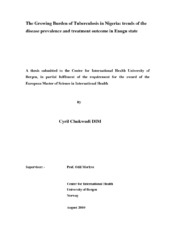| dc.description.abstract | Background: The burden of tuberculosis in Nigeria is the third highest in the world. The data from the TB programme of the States' ministries of health are usually unpublished which possibly contributes to the prevailing ignorance and poor attitude of Nigerians to the disease. Objectives: To determine the trends of TB burden and treatment outcome in Enugu state; and compare the State's disease burden to that of the Nation. Methods: The study was a quantitative action research of secondary data from the TB control programme, Ministry of health, Enugu state, the National annual report of 2008, and WHO TB database within the 10 year period of 2000-2009. Data analysis and presentations were descriptive. Results: The modal age group for new ss+ PTB cases in Enugu state was 25-34 years .The number of female cases was higher than males within the 0-14 year ager group. The annual number of all TB cases showed a raising trend from 914 cases in the year 2000 to 1684 in 2009; but, the reported new ss+ PTB cases fluctuated in a wave-like pattern. The median number of extra-pulmonary TB cases for 2005-2009 was 150 cases while that for the period 2000-2004 was 36 - a four fold increase. The mean prevalence of HIV for all TB cases and new ss+ PTB were 34.4% and 30.7% respectively for the period 2008-2009. Also, the median treatment success rate was 82% (range: 78-85). On the average, Enugu State contributed 1.77% of all TB cases and 2.10% of new ss+ PTB to the national annual TB register and a TB case reported in Enugu state was more likely to be a new ss+ PTB when compared to the whole nation [P < 0.001, OR = 1.33 (95% CI: 1.26, 1.40)] The possible impediments to TB control programme in the State include inadequate funds, ignorance and health seeking pattern of the residents, lack of confidence in the public health care delivery system, non-compliance of private medical practitioners to the approved TB treatment guidelines. Conclusion: Though the burden of TB in Enugu state had increased over the study period, the State's contribution to the disease burden in Nigeria is low. Community participation in TB control and PPM, among other recommendations, will improve TB case detection and treatment in the State. | en_US |
